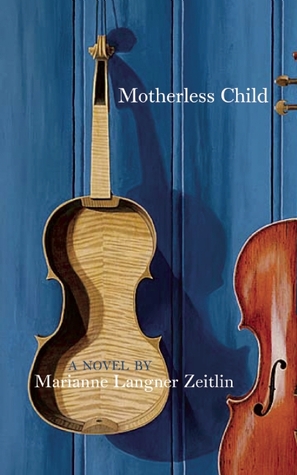Book Review: “Motherless Child” — The Redemptive Powers of Classical Music
By Roberta Silman
For anyone interested in classical music, Motherless Child is a novel to be savored. And there is no doubt that Zeitlin has gotten those details right. She is the widow of the great violinist and teacher Zvi Zeitlin, who died this past May at 90.
Motherless Child by Marianne Langner Zeitlin. Zephyr Press, 300 pages, $17.

In her third novel, Motherless Child, Marianne Langner Zeitlin explores themes of identity, family relationships, loss, and love, but most of all music. At first glance, this seemed to be a novel about the music business, its hazards and frustrations as well as its triumphs. But as I got into this fascinating book, I realized it is more about the redemptive power of music at many different levels—the way music can erase cares and somehow lead us to find the best in ourselves.
The set-up is complicated. In 1977 a 26-year-old woman named Elizabeth Guaragna has decided to give up her job at the Lincoln Center Library for Performing Arts and apply for a job as an assistant to the elderly, famous music manager, Alfred Rossiter. In order to do so, she has to change her name to Lisa Sullivan because her mother Lisabeta Guaragna ran off with Rossiter when she was just an infant and died only a few years later of a heart attack. Rossiter not only robbed the Guaragna family of their mother but no longer nurtured the career of one of his outstanding pianists, Elizabeth’s father, Dominic. On top of that, the second Guaragna child, Christopher, drowned when Elizabeth was six and he was nine. By then the family had come back from Italy, where Dominic had fled with his children after his wife left, and settled in Toronto where his spinster sister Ada taught at the music conservatory. There, with Grandma Adelina, Aunt Ada, and the children, Dominic gave lessons and had a very sporadic concert career.
So we begin with a family that has suffered enormous losses, a tale haunted by Dominic’s bitterness. As Elizabeth thinks at the beginning,
No statue of limitations was ever devised for his kind of grief. In some sort of flagellant expiation, he seemed to Elizabeth to be nursing it deliberately, keeping it alive, as if to forgot for one moment would be to lay himself open to a new onslaught. Grievance was holy, second only to music. But whereas with music he was both slave and master, with grievance he was only slave.
By the time this tale begins, Elizabeth is, quite literally, alone. Her older brother Tom, who is a stutterer, has become a priest and lives mostly in silence in a monastery near Toronto, Grandma and Dominic are dead, and Aunt Ada is in Toronto where Elizabeth returns for holidays. When she gets her new job, her only link to the past is Alfred Rossiter who has stepped down from his prestigious music management company to start something new, and, unaccountably, hired her even though she has no experience in the music business. Into this mix comes Rossiter’s entourage of assistants and a young Boston Brahmin named George Wentworth who is writing Rossiter’s biography, as well as Elizabeth’s former boss, Mr. Penniweather, who shows up at the end in scenes worthy of Dickens, as the mystery unfolds. And both New York and Toronto are portrayed with a judicious eye for detail.
But it is Elizabeth and her quest for truth who captures our attention. That Zeitlin manages to convey the burdens that weigh so heavily on her without becoming maudlin is a testament to her talent. In this spunky girl, she has created an engaging character who lives and breathes on the page, and if Elizabeth is more naive than sometimes seems possible—at least to this reader who figured out what was going on long before the dramatic end—you cannot help but be interested in her as she matures and realizes that identity can have many faces and that trying to change one’s identity can lead to all sorts of scrapes. As her search also leads her into love, you read with the pleasure of delicious anticipation until Elizabeth finally understands that this story is much more complex than she ever imagined.
It would be unfair to give away the intricate plot that Zeitlin has created; it is one of the reasons you keep reading. Yet, because there is a lot of music talk between Alfred and Elizabeth and Alfred and George, there are also wonderful tidbits about the amazing successes of real people in classical music in the span of Rossiter’s career. There is also exploration of the tragedies as well, such as the untimely deaths of William Kapell and Guido Cantelli in airplane crashes. For someone like me, those nostalgic details, which seem to come exactly at the right moments, brought shivers down the spine. So did some of her descriptions of the emotions evoked by listening to piano music, and as I read, I became increasingly sorry that my parents, who came from a generation that adored the piano, are not alive to read this book. Indeed, for anyone interested in classical music, Motherless Child is a novel to be savored. And there is no doubt that Zeitlin has gotten those details right, for she is the widow of the great violinist and teacher Zvi Zeitlin, who died this past May at 90 and who, I hope, read her book before his death.
Most important, this is a brave look at a world filled with so much talent and hard work and, for so many, disappointment and sorrow. Here is Aunt Ada on her brother’s career after Elizabeth has said, “. . . he had a lot of success—”:
“No, my child,” her aunt said, closing her eyes. “He had a moderate success. Failure is easier. You fail, you pick up the pieces, you go on to other things. That’s far easier than the continuance of hope, of thinking, maybe, next time you will be it, all the stars in heaven will come together and ecco, you’re made. The overnight success that’s thirty years in the making. Success is preordained by the kind of build-up you get before you come to a town. By the size of your fee. Tell the public they are going to hear the greatest artist of all time and they come expecting to hear that. . . So it becomes a self-fulfilling prophecy. . .Everybody wants to talk about the time they heard Horowitz . . . But have an artist come in as a fill-in because the budget couldn’t afford anybody else and that same Horowitz could be doomed to oblivion. To the boondocks. That’s what Rossiter did to Dom—he condemned him to a moderate success.
My only caution about is that the beginning can seem a bit confusing. Zeitlin starts with too much clutter in Alfred’s office—details that I found unnecessary to the story, what my teacher Grace Paley used to call “too much doorknob turning.” But once she hits her stride, the novel takes off. So persist. For the rewards are much greater than they may seem at first.
Roberta Silman is the author of Blood Relations, a story collection; three novels, Boundaries, The Dream Dredger, and Beginning the World Again; and a children’s book, Somebody Else’s Child. She writes regularly for The Arts Fuse and can be reached at rsilman@verizon.net.

